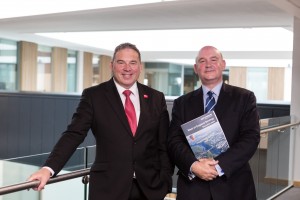West of England business and local authority leaders have been urged to “stop dithering” and help develop a stronger regional economy that builds on its position as one of the UK’s leading centres for innovation and creativity.
The recently formed West of England Combined Authority (WECA) is drawing up a new economic blueprint for the region, taking as its starting point the creation of a “beacon of growth and innovation” where everyone can reach their potential.
But while its recognises the region’s huge potential, it also acknowledges that its local authorities and business leaders have often pulled in different directions and rarely spoken with one voice. 
Pictured at the discussion paper launch: LEP interim chair Steve West, left, and West of England Mayor Tim Bowles
Launching a discussion document on the new strategy to business leaders at UWE Bristol’s new Business School last Wednesday, West of England Local Enterprise Partnership (LEP) interim chair Prof Steve West said: “While we are doing well, we could do better. We aren’t punching as hard as we could be.
“Our record of delivery isn’t good. We dither. We need to get over ourselves. We need to be ambitious and think bigger than we have ever done before. We need to demonstrate to the government that we can act together.
“We must have a single voice. I can’t express that enough. Our competitors in the North and Midlands are doing that. When they speak to government and inward investors they speak with one voice – businesses, universities and local authorities.
“We have huge assets and we are a net contributor to the Treasury – way above the national average.
“It would be quite nice to get some of that resource back.”
But while the region had a great heritage in engineering and innovation going back to Brunel and now boasted high-growth sectors such as tech and creative, it had a poor record of building on its strengths, Prof West – who is also UWE’s vice-chancellor – said.
The region’s innovation and creativity meant it could lead the UK in future sectors such as the Internet of Things (IoT), but it must look to the long-term and “not use our rear-view mirror” when discussions took place.
The economic strategy will be built on three key pillars – infrastructure, skills and housing.
Metro Mayor Tim Bowles, who officially launched the discussion paper, urged the business leaders at the gathering to get involved and work with the region’s local authorities and voluntary sector. But he said the region had also been held back in the past by its reluctance to talk about its success.
“Today is a really big milestone for the West of England,” he said. “We have got a really, really powerful story to tell. To be honest I don’t think that we tell it enough.
“Our economy has outperformed the national average for decades. We are a great place to live and work and we have a great talent pool. And it’s not just about big businesses – our smaller enterprises have the best survival rate in the whole country.”
He acknowledged there were challenges. The region’s population grew by 9% between 2001 and 2011 – more than any other city-region – and s expected to grow by a further 19% by 2025. This put pressure on housing and infrastructure. And the prosperity in the region was not benefiting everyone, he acknowledged.
But he said discussions were taking place with housing developers to build more affordable homes and with transport operators to open new railway stations and get more buses on the region’s roads.
“Since I was elected in May, I’ve been working with our council partners, businesses, universities and colleges, housing and transport providers, and learned more about their challenges and priorities,” he said
“This draft strategy has been developed as a result of those conversations and will become the framework around which important future decisions, including funding decisions, will be made.”
The draft strategy is available on WECA’s website – www.westofengland-ca.org.uk – where there is also an online questionnaire to provide feedback, which will be incorporated into a final strategy to be published in the autumn.
This will then be used to inform the authority’s more detailed plans, priorities and funding decisions.
The combined authority covers Bristol, South Gloucestershire and Bath & North East Somerset. The LEP also includes North Somerset.



















